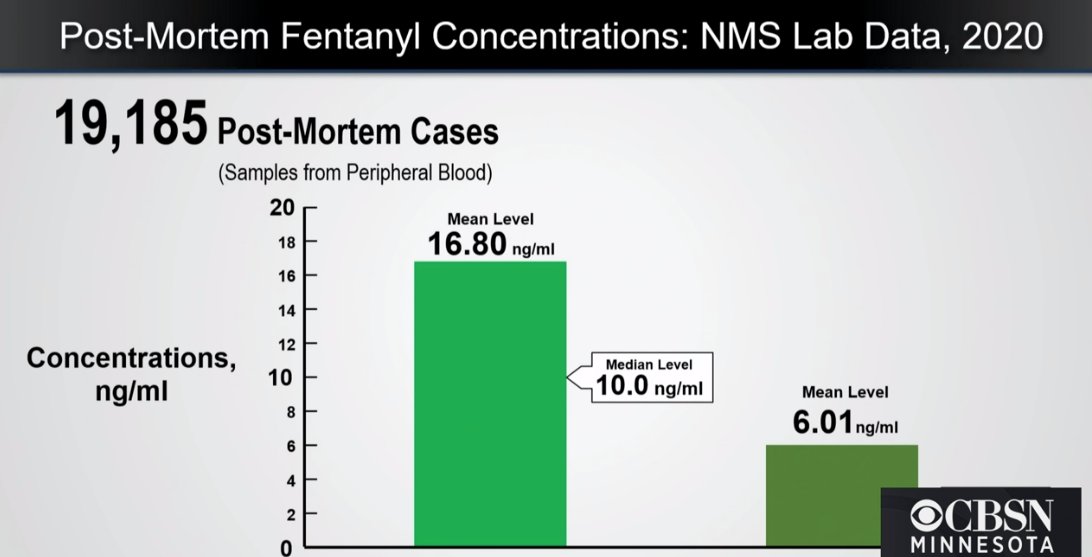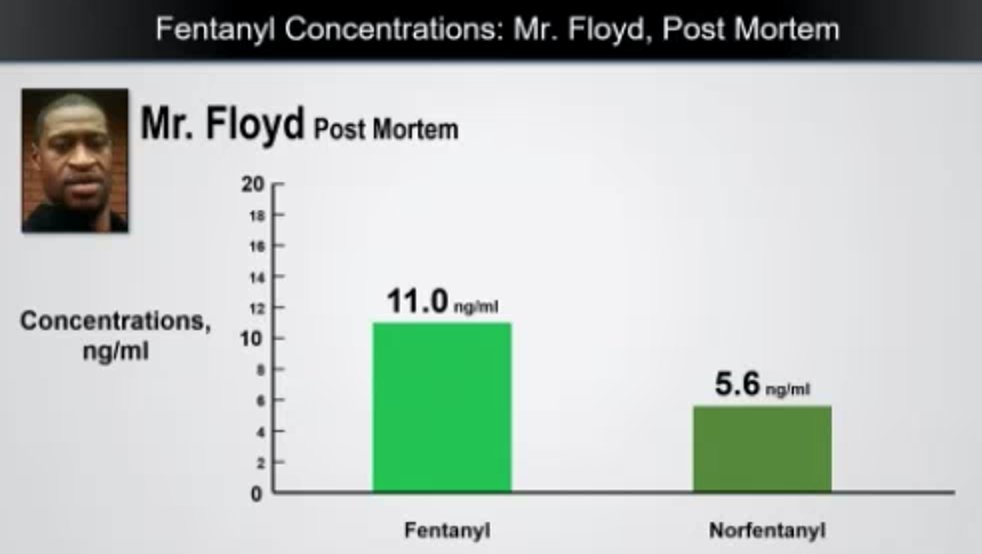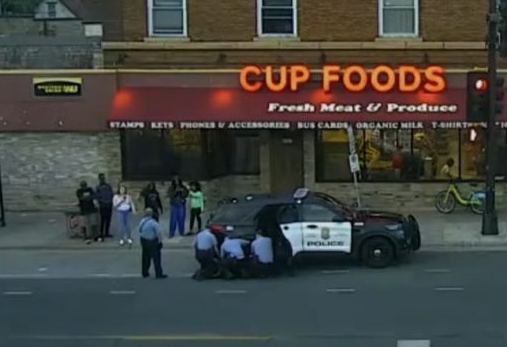
Testimony is resuming this morning in the #DerekChauvinTrial. Medical experts are expected to take the stand.
Also, Judge Cahill is expected to decide on whether a man who was with #GeorgeFloyd in the moments before his death will testify.
WATCH LIVE: cbsloc.al/39Qfl0H
Also, Judge Cahill is expected to decide on whether a man who was with #GeorgeFloyd in the moments before his death will testify.
WATCH LIVE: cbsloc.al/39Qfl0H

Before testimony began, Eric Nelson, the attorney for Derek Chauvin, noted that the state intends to call Andrew Baker, the Hennepin County medical examiner who performed the autopsy on #GeorgeFloyd, tomorrow.
First up today is Dr. Martin Tobin, a physician in pulmonary critical care.
He defined pulmonology as "the study of the lungs...of all diseases that effect the respiratory system."
He is being questioned by prosecutor Jerry Blackwell.
He defined pulmonology as "the study of the lungs...of all diseases that effect the respiratory system."
He is being questioned by prosecutor Jerry Blackwell.

Tobin has been a physician for almost 46 years. He set up one of the first sleep labs in the United States.
Currently, Tobin is the primary care physician for all ICU patients at Hines VA Hospital in Chicago. He also teaches at Loyola.
Currently, Tobin is the primary care physician for all ICU patients at Hines VA Hospital in Chicago. He also teaches at Loyola.
Tobin says that he's authored a "large textbook" on mechanical ventilation. It's 1,500 pages long.
He describes his research as focused on breathing.
WATCH LIVE: cbsloc.al/39Qfl0H
He describes his research as focused on breathing.
WATCH LIVE: cbsloc.al/39Qfl0H
Tobin says he's lectured in Minnesota at the Mayo Clinic, which gave him an award it only gives to one doctor every 10 years.
Tobin tells the court that he's been an expert witness before -- mostly in medical malpractice cases. He's never been an expert in a criminal case.
Tobin says he's not being paid to be an expert.
WATCH LIVE: cbsloc.al/39Qfl0H
Tobin says he's not being paid to be an expert.
WATCH LIVE: cbsloc.al/39Qfl0H
When asked on his opinion on #GeorgeFloyd's death, Tobin said that Floyd died from a "low level of oxygen."
He says this caused damage to Floyd's brain and an arrhythmia that caused his heart to stop.
WATCH LIVE: cbsloc.al/39Qfl0H
He says this caused damage to Floyd's brain and an arrhythmia that caused his heart to stop.
WATCH LIVE: cbsloc.al/39Qfl0H
Tobin says the main forces that led to Floyd's fatal "shallow breaths" were:
- Floyd's lying prone
- Floyd being handcuffed
- Floyd having a knee on his neck
- Floyd having a knee on his back/side
WATCH LIVE: cbsloc.al/39Qfl0H
- Floyd's lying prone
- Floyd being handcuffed
- Floyd having a knee on his neck
- Floyd having a knee on his back/side
WATCH LIVE: cbsloc.al/39Qfl0H
Tobin is now showing a rendering of the officers holding down #GeorgeFloyd.
"Officer Chauvin's left knee is on the neck for the vast majority of the time."
WATCH LIVE: cbsloc.al/39Qfl0H
"Officer Chauvin's left knee is on the neck for the vast majority of the time."
WATCH LIVE: cbsloc.al/39Qfl0H

The transmission feed from the courthouse has apparently locked up.
We'll start streaming the trial again once the issue is resolved.
We'll start streaming the trial again once the issue is resolved.
And we're back. The feed is up.
What we missed was Tobin testifying that the handcuffs combined with #GeorgeFloyd's placement on the street created a vice on his left side.
WATCH LIVE: cbsloc.al/39Qfl0H
What we missed was Tobin testifying that the handcuffs combined with #GeorgeFloyd's placement on the street created a vice on his left side.
WATCH LIVE: cbsloc.al/39Qfl0H

Tobin says that #GeorgeFloyd was trying to breathe with his fingers and knuckles, pushing them against the street and the squad car to "crank up" his right side in order to breathe.
WATCH LIVE: cbsloc.al/39Qfl0H
WATCH LIVE: cbsloc.al/39Qfl0H

Tobin is now explaining how the hypopharynx works. He says that if this small airway is blocked, it'll affect the body almost immediately.
WATCH LIVE: cbsloc.al/39Qfl0H
WATCH LIVE: cbsloc.al/39Qfl0H
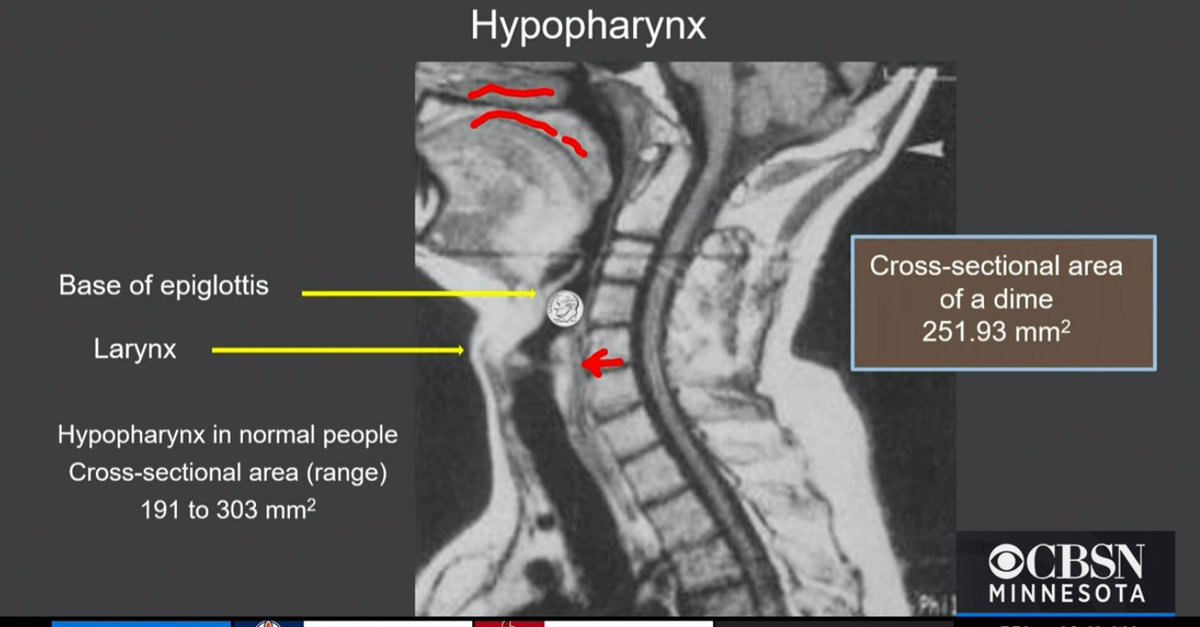
Tobin explains that there's no obstruction of the hypopharynx in the photo on the left.
However, in the photo on the right, Tobin says that the knee is compressing the hypopharynx as Floyd is trying to crank himself up to breathe.
WATCH LIVE: cbsloc.al/39Qfl0H
However, in the photo on the right, Tobin says that the knee is compressing the hypopharynx as Floyd is trying to crank himself up to breathe.
WATCH LIVE: cbsloc.al/39Qfl0H

In the left image, Tobin notes that Chauvin's foot is not touching the ground. As such, all of the weight is coming down on #GeorgeFloyd's neck.
In the right image, Tobin explains the weight pressing down on Floyd here is more than 90lbs.
WATCH LIVE: cbsloc.al/39Qfl0H

In the right image, Tobin explains the weight pressing down on Floyd here is more than 90lbs.
WATCH LIVE: cbsloc.al/39Qfl0H


The court is now taking its 20-minute morning break.
Court has resumed.
Dr. Tobin is now explaining the moment that he believes that #GeorgeFloyd suffered a brain injury as a result of a low level of oxygen.
WATCH LIVE: cbsloc.al/39Qfl0H
Dr. Tobin is now explaining the moment that he believes that #GeorgeFloyd suffered a brain injury as a result of a low level of oxygen.
WATCH LIVE: cbsloc.al/39Qfl0H

Tobin says that according to his calculations, Derek Chauvin had his left knee on #GeorgeFloyd's neck nearly the entire time for the first 5 minutes of the restraint.
He said that Chauvin's right knee was on Floyd's back 57% of that time, as shown in body camera video.
He said that Chauvin's right knee was on Floyd's back 57% of that time, as shown in body camera video.
Tobin is now explaining lung function and tidal volume. (Left image).
The doctor says he calculated #GeorgeFloyd's tidal volume based on his sex, age and height. (Right image).
WATCH LIVE: cbsloc.al/39Qfl0H

The doctor says he calculated #GeorgeFloyd's tidal volume based on his sex, age and height. (Right image).
WATCH LIVE: cbsloc.al/39Qfl0H


Tobin says that lung volumes decrease by about 24% when people are in the prone position.
When asked if this is important in the case of #GeorgeFloyd. Tobin says this is "extremely important."
When asked if this is important in the case of #GeorgeFloyd. Tobin says this is "extremely important."

Tobin explains that sleeping in the prone position is not dangerous because people have oxygen reserves in their lungs.
He also notes that the prone position can help people with pneumonia (or COVID) in that it can allow for better "matching" between air sacks and blood vessels
He also notes that the prone position can help people with pneumonia (or COVID) in that it can allow for better "matching" between air sacks and blood vessels
Now Tobin is explaining his calculations on how the knees on #GeorgeFloyd's neck and back, in addition to being prone, reduced his EELV by 43%, thereby reducing oxygen reserves by 43%.
WATCH LIVE: cbsloc.al/39Qfl0H
WATCH LIVE: cbsloc.al/39Qfl0H

Using a series of slides, Tobin explains how the hypopharynx reacts to being prone with pressure applied to the back.
WATCH LIVE: cbsloc.al/39Qfl0H
WATCH LIVE: cbsloc.al/39Qfl0H

Tobin says he can tell the precise time when #GeorgeFloyd lost consciousness.
He says that you can tell by facial features.
Also, once oxygen levels fall to 36 mm Hg, people lose consciousness.
Floyd's normal oxygen level was 89 mm Hg.
WATCH LIVE: cbsloc.al/39Qfl0H
He says that you can tell by facial features.
Also, once oxygen levels fall to 36 mm Hg, people lose consciousness.
Floyd's normal oxygen level was 89 mm Hg.
WATCH LIVE: cbsloc.al/39Qfl0H
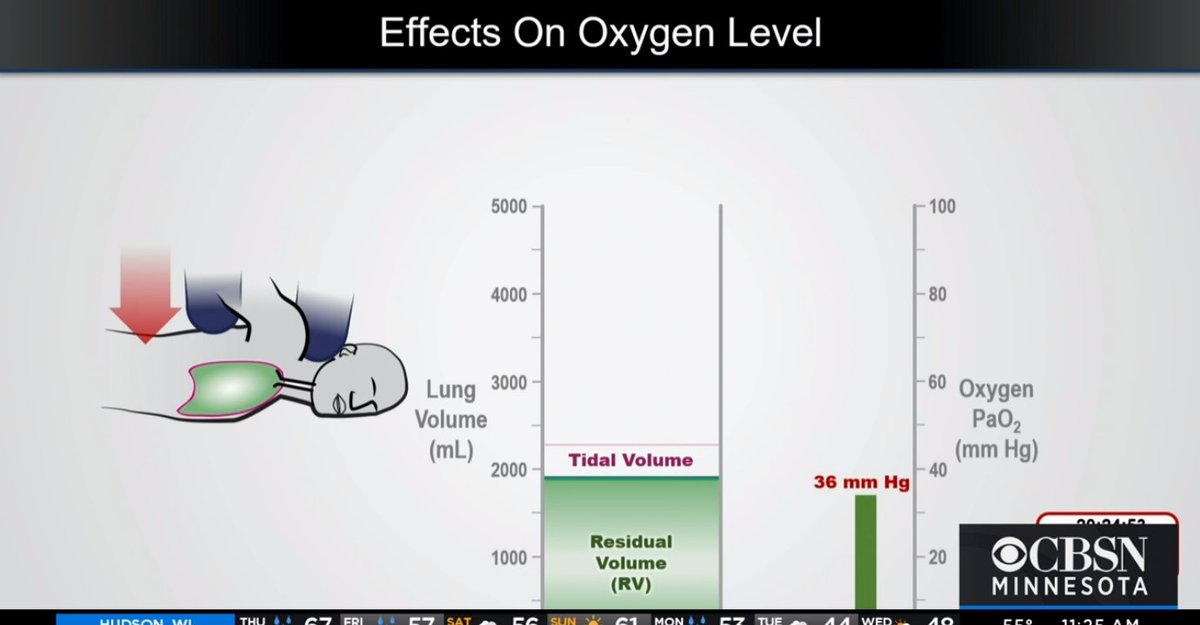
Additionally, Tobin says he can calculate when there's "not an ounce of oxygen left" in #GeorgeFloyd's body.
The doctor says that Derek Chauvin continued to kneel on Floyd's neck for minutes after Floyd's oxygen level was at zero.
WATCH LIVE: cbsloc.al/39Qfl0H
The doctor says that Derek Chauvin continued to kneel on Floyd's neck for minutes after Floyd's oxygen level was at zero.
WATCH LIVE: cbsloc.al/39Qfl0H
Tobin is now addressing studies that show people can breathe with weights placed on their back.
He calls these studies "highly misleading."
He calls these studies "highly misleading."
Tobin is now addressing #GeorgeFloyd's medical history.
The doctor says that a healthy person would have died from the restraint Floyd was placed in.
WATCH LIVE: cbsloc.al/39Qfl0H
The doctor says that a healthy person would have died from the restraint Floyd was placed in.
WATCH LIVE: cbsloc.al/39Qfl0H
When asked if it's true that if someone can speak then they can breathe, Tobin said that's true, but gives a false sense of security.
"When you can speak you are breathing, but it doesn't mean you are breathing five seconds later."
"When you can speak you are breathing, but it doesn't mean you are breathing five seconds later."
According to Tobin, when #GeorgeFloyd said "I can't breathe," he still had oxygen in his brain. But shortly thereafter, he had a major loss of oxygen, evidenced by the movement of his leg.
"The leg is crucial here."
WATCH LIVE: cbsloc.al/39Qfl0H
"The leg is crucial here."
WATCH LIVE: cbsloc.al/39Qfl0H
A short clip of #GeorgeFloyd's arrest is played in court. It shows Floyd's leg lift up backwards as he lies prone.
"The bottom line is the leg jumps up like that as a result of a fatally low level of oxygen in the brain," Tobin said.
"The bottom line is the leg jumps up like that as a result of a fatally low level of oxygen in the brain," Tobin said.
Tobin also says he examined #GeorgeFloyd's rate of breathing.
"It's one of the vital signs...It gives us a lot of clues as to what's happening inside the body."
WATCH LIVE: cbsloc.al/39Qfl0H
"It's one of the vital signs...It gives us a lot of clues as to what's happening inside the body."
WATCH LIVE: cbsloc.al/39Qfl0H

The court shows a 17-second clip of #GeorgeFloyd's arrest. Tobin counts out eight breaths during that time, a respiratory rate of 22.
"Extremely significant," he said, explaining that if fentanyl was in Floyd's system, his respiratory rate would have been around 10.
"Extremely significant," he said, explaining that if fentanyl was in Floyd's system, his respiratory rate would have been around 10.
Tobin says that #GeorgeFloyd took his last breathe at 20:25:16 -- or 8:25:16.
It wasn't until 9 minutes later that paramedics pumped oxygen into Floyd's lungs.
Tobin says this produced the elevated levels of CO2 in his lungs -- not fentanyl.
It wasn't until 9 minutes later that paramedics pumped oxygen into Floyd's lungs.
Tobin says this produced the elevated levels of CO2 in his lungs -- not fentanyl.
Tobin explains he can tell the moment of Floyd's death due to changes in his facial expression.
"I'm very familiar with watching people die," he said.
WATCH LIVE: cbsloc.al/39Qfl0H
"I'm very familiar with watching people die," he said.
WATCH LIVE: cbsloc.al/39Qfl0H
After about two hours, Tobin's direct questioning ends.
The court is now taking a lunch break until 1:30 p.m.
The court is now taking a lunch break until 1:30 p.m.
Defense Eric Nelson asked Dr. Tobin if he was a pathologist, Tobin said no. Nelson brings up "wooden chest syndrome" related to fentanyl.
In redirect from the state, Dr. Tobin says that fentanyl didn't cause the death.
Attorney Eric Nelson asks if fentanyl can cause death by low oxygen levels.
"Yes, but only in part."
Tobin excused after follow-up. Court takes short break.
"Yes, but only in part."
Tobin excused after follow-up. Court takes short break.
Dr. Daniel S. Isenschmid now takes the stand. He works as a forensic toxicologist at NMS Labs in Horsham, PA.
Watch: wcco.com/cbsn
Watch: wcco.com/cbsn
State is asking Dr. Isenchmid about the effects of opioids, including fentanyl. #DerekChauvinTrial
Defense begins cross-examination of Dr. Isenschmid.
Nelson questions Dr. Isenchmid about fentanyl and norfentanyl levels found in the sample, and compares to the body metabolizing alcohol at a fixed rate. Isenchmid says that with some drugs the body processes at a different rate.
State objects as Nelson asks the witness about whether he's familiar with the term "hooping," and when instructed by Cahill to answer, Isenschmid said he is not familiar with the term.
Nelson appears to be trying to question the language in one of the slides presented earlier in the afternoon. Audio is cut from court, and Cahill announces 20-minute break while they work something out.
Cahill, Nelson and prosecution are using the 20-minute recess to go over updated slides presented to the jury today.
Cahill says he believes everyone is "acting in good faith" and Nelson clarifies that he actually had the updated copy and thought the two were identical copies. Court will reconvene at 3:40 p.m.
Cross-examination of Dr. Isenschmid continues with Nelson asking further questions about his lab's analysis of the fentanyl concentration in Floyd's system. Now asking Isenschmid if he's heard of "goofballs" or "speedballs."
Nelson wraps cross-examination; prosecution begins redirect.
Prosecutors probe Isenschmid about observation that Floyd's fentanyl levels were shown to be lower than majority of DUI, which he affirms. Witness released from the stand. Prosecutors now call Dr. Bill Smock, from Kentucky, an emergency physician who's studied forensic medicine.
Smock will be the final witness for the day, and Cahill says court expected to continue to 5:15 p.m.
After going over Smock's background in forensics, prosecution asks him to illustrate the function of tolerance when it comes to the human body and ingestion of controlled substances. Compares "naive drinkers" against those who drink regularly.
Smock says that, in his view, George Floyd died from "positional asphyxia," or "a fancy way of saying" he had no oxygen left in his body. 

Now, prosecution flashes list of 10 signs of "excited delirium," in order to go through why Smock does not believe it applies in Floyd's death. 

Smock says that his analysis of Floyd indicates that he exhibited none of the 10 signs of "excited delirium" prior to his death. "Zip," he said. Says that 6 of the signs would need to be present to diagnose it.
Probed by prosecution, Smock delves into topic of "air hunger," saying it's the state of doing whatever it takes to breathe, saying Floyd's pleas of "I can't breathe" speak to that state. Holds this in contrast to behavior typically observed in overdose cases.
Smock continues, Floyd's visible struggles to breathe and verbal cues do not indicate a fentanyl overdose. "That's someone begging to breathe."
Prosecution plays clips from Keung's bodycam. Smock draws attention to the difference between Floyd's voice early in the incident compared to when he's on the ground. Also highlights Floyd's fist pushing against the squad tire, saying it's in an attempt to raise his right side.
Smock says that resuscitative efforts should have started significantly sooner on Floyd. Prosecution rests, and defense prepares to cross-examine.
Nelson asks Smock if it's fair to say he's not a pathologist. Smock agrees, and says he's studied forensic pathology as it applies to living patients. Asked how many autopsies he has performed, he says about 100, but adds he's observed thousands.
Asked if he's seen anything in Floyd's autopsy that would indicate an obstructed airway, Smock says he did not.
Nelson asks Smock whether, if Derek Chauvin's knee was at the base of George Floyd's neck, that wouldn't affect his diaphragm. Smock said it wouldn't.
After Nelson asks about heart disease and the prosecution raises objections, defense rests. Prosecution comes out of the gate asking if there's any evidence that Floyd died of a heart attack. Smock says, "Absolutely not."
Asked if he believes Floyd died of a fentanyl overdose, or an amphetamine dose, or a combination of the two, Smock says, "No, he did not." Prosecution rests.
Cahill thanks the jury for their patience in "sticking this out" later than usual, and adjourns court until Friday morning. | cbsloc.al/3sYCcPk
• • •
Missing some Tweet in this thread? You can try to
force a refresh
